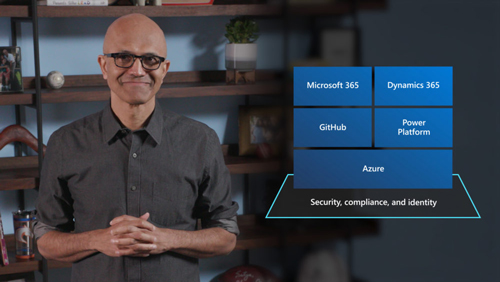Inspire: Nadella Urges Partners To Embrace 'Tech Intensity'
Satya Nadella has been shopping around the term "tech intensity" for a year-and-a-half as a sort of refinement of, or at least a related concept to, "digital transformation."
But at the Microsoft Inspire partner conference on Wednesday, the Microsoft CEO elevated "tech intensity" to an organizing principle that can help companies both weather the current historic global challenges and perhaps grow after those challenges have started to recede.
"While the pandemic has taught us that no business is 100 percent resilient, those fortified by digital technology are more resilient, more capable of transforming when faced with these secular structural changes in the marketplace. We call this tech intensity, and every organization and every industry will increasingly need to embrace it in order to be successful and grow," Nadella said during his keynote at the two-day virtual event that wrapped up Wednesday (emphasis added).
Nadella said Microsoft is working with the Harvard Business School to develop frameworks and scorecards for companies in various verticals related to tech intensity.
"Tech intensity inside of an organization creates new operating architecture, breaking up the traditional silos to expose the technology and data and business process workflows inside the company in a very modular platform. This enables citizen developers, in collaboration with their digital and IT teams, to respond to these changes in the marketplace, this new opportunity, with agility. Our collective opportunity is to channel this intelligent cloud and the intelligent edge era into tech intensity for every business on the planet," Nadella said.
In the lead-up to his tech intensity definition, Nadella worked through a several verticals where customers and partners are exhibiting tech intensity.
They included:
- Health care and the surge in telehealth: "More than half of the primary care visits at some of the major health care systems are now being conducted virtually, and providers are increasingly relying on new capabilities like these AI-assisted bots to ensure patients get the information they need whenever and wherever they need it."
- E-commerce: "[It] has been pulled forward multiple years, according to one analyst. Offline retailers are embracing new models like contactless shopping, curbside pickup."
- Financial tech: "People [are putting] aside their physical wallets in favor of digital ones, and banks are harnessing the power of AI to manage risk."
- Manufacturing: "Every category [is] moving to automate everywhere, simulate anything and quickly advancing from early experiments with IoT and AI to rapid adoption at scale, creating digital twins and using mixed reality for remote assistance and field service."
 [Click on image for larger view.]
[Click on image for larger view.]
Fitting the effort to Microsoft's product set, Nadella emphasized a hierarchy with Azure at the foundation, GitHub and Power Platform in a middle development layer, and Microsoft 365 and Dynamics 365 on top. Enhancing the three clouds and development tools were Microsoft's security, compliance and identity tools.
Posted by Scott Bekker on July 22, 2020